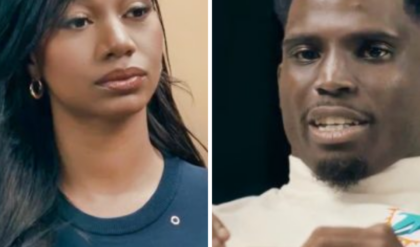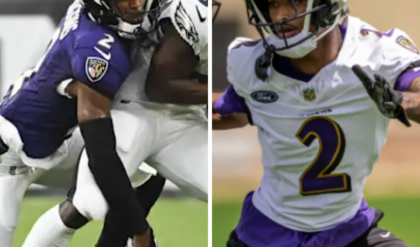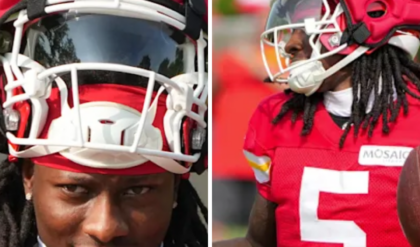
Before The Tortured Poets Department was ever a glimmer in Taylor Swift’s eye, the singer peppered her music with references to classic literature.
As early as 2006, Swift included a nod to Robert Frost’s poem “The Road Not Taken” in the song “The Outside” from her self-titled debut album. “I tried to take the road less traveled by,” she sang. “But nothing seems to work the first few times, am I right?”
Up Next – Kelly Clarkson and Ex Brandon Blackstock Set Trial Date for August
Up Next – Kelly Clarkson and Ex Brandon Blackstock Set Trial Date for August
Ad 1 of 1 (0:28)
Next
Stay




volume_off
-0:28
fullscreen
Auto (360p)
225p
360p
480p
720p
Subtitles Off
UP NEXT

Kelly Clarkson and Ex Brandon Blackstock Set Trial Date for August
1:42

Comedians at Tom Brady’s Roast Were Told Not to Make Robert Kraft Jokes
1:29

Breaking Beuty: Us Weekly’s Editors Try First Aid Bronze + Glow Drops with Niacinamide
2:19

Danielle Brooks on Struggles With Postpartum Depression: I ‘Really Struggled to Accept This New Person’
1:29

Will Kate Middleton be at the Annual Trooping of the Colour?
1:29

Royal Expert Suggests Timing of Prince William’s New Title Is a ‘Tremendous Insult’ to Prince Harry
2:23

Where Was Travis Kelce During Taylor Swift’s 1st ‘Eras’ Show in Paris?
1:15

Meghan Markle Reveals Touching Moment With Daughter Princess Lilibet
1:07

Sasha Pieterse Would Love to do a ‘PLL: Original Sin’ Cameo — So Emily and Alison Could Back Together
1:50

Justin Bieber Ex Reacts To Hailey Bieber Girlfriend
1:31
arrow_back_ios_new
arrow_forward_ios
The lines were the first of many literary references to come, with Swift later folding in allusions to works by authors including Charles Dickens and Nathaniel Hawthorne. Perhaps most famously, her Fearless single “Love Story” borrows from William Shakespeare’s play Romeo and Juliet. In 2010, Swift said that studying the play in ninth grade partially inspired the track.
“A lot of people who gravitate toward music are really, really sort of drawn to poetry because the words all have a rhythm and it comes together just right,” she said during a talk at Scholastic headquarters. “I love poetry, because if you get it right, if you put the right rhymes at the right ends of the sentences, you can almost make words bounce off a page.”
Keep reading for a complete, alphabetical guide to all of the literary references in Swift’s discography:

Marcelo Endelli/TAS23/Getty Images for TAS Rights Management
‘Alice’s Adventures in Wonderland’
Swift’s first tribute to Lewis Carroll’s beloved children’s book came in 2014 on 1989 via the bonus track “Wonderland.” In the song, the narrator and her lover fall “down a rabbit hole” and get lost in a “wonderland” together. “Didn’t you calm my fears with a Cheshire Cat smile?” she sings at one point.
Swift revisited Carroll’s work on “Long Story Short” from 2020’s Evermore with the line, “I fell from the pedestal, right down the rabbit hole.”
‘All’s Well That Ends Well’
Shakespeare’s comedy gets a quick nod in “All Too Well (10 Minute Version)” from Red (Taylor’s Version), which dropped in 2021. Swift begins the fourth verse with the lines, “They say all’s well that ends well, but I’m in a new hell / Every time you double-cross my mind.”
She previously referenced the play on “Lover” from the 2019 album of the same name, singing, “All’s well that ends well to end up with you.”
‘American Pie’
To millennials of a certain age, American Pie is literature — don’t @ Us. Swift references the sex comedy on TTPD’s “So High School,” which is almost certainly about her romance with Travis Kelce.
Aristotle
“So High School” also includes a nod to the Greek philosopher Aristotle, who is considered by many to be the first scientist. “You know how to ball, I know Aristotle,” seemingly referencing memes that compare Kelce and Swift’s intelligences.
The Bible
“Now That We Don’t Talk” from 1989 (Taylor’s Version), released in 2023, includes an allusion to a Bible story from the book of Exodus. “You part the crowd like the Red Sea, don’t even get me started,” Swift sings, referencing Moses leading the Israelites out of Egypt.
Swift drew on her Sunday school knowledge again on “Guilty as Sin?” from TTPD, referencing Jesus’ crucifixion and resurrection with the lines, “What if I roll the stone away? / They’re gonna crucify me anyway / What if the way you hold me is actually what’s holy?”
TTPD’s “The Prophecy” also includes a nod to the Genesis story of Adam and Eve in the first verse with the line, “I got cursed like Eve got bitten.” (John Milton stans, this is apparently as close as we’re getting to a Paradise Lost reference.)
Cassandra
Swift makes one of her many references to Greek mythology on TTPD’s “Cassandra,” which features the chorus, “So, they killed Cassandra first ’cause she feared the worst / And tried to tell the town / So they filled my cell with snakes, I regret to say / Do you believe me now?” Cassandra was the daughter of King Priam and Queen Hecuba of Troy. She had the gift of prophecy, but the god Apollo cursed her so that her predictions would not be believed.
‘Compassion’
In the song “Ivy” from 2020’s Evermore, Swift borrows a line from Miller Williams’ poem “Compassion,” published in 1997. “I’d meet you where the spirit meets the bones,” she sings in the first verse. Williams’ poem, meanwhile, reads, “You do not know what wars are going on down there where the spirit meets the bone.”
Dylan Thomas
Swift name-drops the Welsh poet in TTPD’s title track, singing, “I laughed in your face and said, ‘You’re not Dylan Thomas, I’m not Patti Smith.’”
‘Grand Theft Auto’
Again, Grand Theft Auto is literature to millennials of a certain age, so don’t @ Us. The video game pops up in TTPD’s “So High School” in the line, “Touch me while your bros play Grand Theft Auto.”
‘The Great Gatsby’
Swift made her first reference to the F. Scott Fitzgerald novel on “This Is Why We Can’t Have Nice Things” from 2017’s Reputation with the lyric, “Feeling so Gatsby for that whole year.” As former high school students may recall, titular character Jay Gatsby (a.k.a. Jimmy Gatz) is famous for throwing lavish parties that hide his shady background.
Three years later, Swift nodded to the book again in “Happiness” from Evermore. The lyric, “I hope she’ll be a beautiful fool who takes my spot next to you” is a play on the character Daisy’s remark that she hopes her daughter will be a “beautiful little fool,” while the line, “All you want from me now is the green light of forgiveness” recalls the book’s famous green light, which symbolized the unattainable nature of Gatsby’s dreams.
‘Humpty Dumpty’
“The Archer” from Lover quotes the classic nursery rhyme “Humpty Dumpty” with the lyrics, “All the king’s horses, all the king’s men / Couldn’t put me together again.”
‘The Iliad’
1989 bonus track “You Are in Love” includes an oblique reference to The Iliad in the line, “And you understand now why they lost their minds and fought the wars.” While it’s not explicit, this seems to be a nod to the mythological Trojan War, where the Greeks and the Trojans fought over Paris taking Helen from her husband, Menelaus, the king of Sparta.
“State of Grace” from Red includes an allusion to Achilles, a hero of the Trojan War, with the lyric, “These are the hands of fate, you’re my Achilles heel.” Homer’s Iliad, however, makes no mention of Achilles having a weakness in his heel.
King Midas
Swift is apparently something of a mythology buff because “Champagne Problems” features a reference to King Midas, who could turn anything to gold by touching it. Swift mentions the mythological royal while describing a character in the song, singing, “Your Midas touch on the Chevy door.”
Nancy Mitford
While some Swifties thought “The Bolter” would be about a viral paparazzi shot of Joe Alwyn fleeing a car, the TTPD track actually seems to be inspired by a character in Mitford’s novels known as The Bolter. Mitford was an English author famous for writing 1945’s The Pursuit of Love and 1949’s Love in a Cold Climate.
While The Bolter of Mitford’s books was fictional, she was inspired by a real person: Idina Sackville, who is the subject of Frances Osborne’s nonfiction book The Bolter: The Story of Idina Sackville, Who Ran Away to Become the Chief Seductress of Kenya’s Scandalous “Happy Valley Set,” which was published in 2008. Osborne is the great-granddaughter of Sackville, who was known for getting married and divorced multiple times and flaunting conventions in the early 20th century.
‘One for the Money’
“Champagne Problems” also includes a nod to the classic children’s rhyme “One for the Money,” which has been around since the 19th century. Swift’s lyrics read, “One for the money, two for the show / I never was ready, so I watch you go.”
Patti Smith
Smith also appears in “TTPD” alongside Thomas. While she’s known primarily as a singer-songwriter, Smith is also a prolific author, having written the memoirs Just Kids and M Train as well as several books of poetry.
Peter Pan
On the Folklore track “Cardigan,” Swift references the fictional character created by J.M. Barrie. At one point, she names Peter directly, saying, “Tried to change the ending / Peter losing Wendy.” Later in the track, she discusses “chasin’ shadows in the grocery line,” which seems to be an allusion to the way Peter chases his own shadow while visiting the Darling children.
TTPD: The Anthology includes a whole track about Peter Pan, fittingly titled “Peter.” Swift sings about never growing up and includes a line where she says her love interest was “lost to the Lost Boys chapter” of his life. The Lost Boys were Peter Pan’s pals in Neverland who famously never grew up.
‘Rapunzel’
Swift flexes her fairy-tale muscles again on TTPD’s “The Albatross,” when she sings the line, “Locked me up in towers but I’d visit in your dreams.” This could be a reference to the story of Rapunzel, who was locked in a tower. The witch who locked her there would visit by climbing Rapunzel’s hair.
The Red Thread of Fate
“Invisible String” from Folklore draws inspiration from the idea of the red thread of fate, a concept from East Asian mythology. The red thread of fate is an invisible cord tied around the fingers of people who are destined to meet. In the Chinese version of the tale, Yue Lao, the god of marriage and love, is in charge of binding people with the red thread.
Robert Frost
Swift has not but three songs that include nods to Frost’s “The Road Not Taken.” The first came on “The Outside” from her 2006 debut album when she sang, “I tried to take the road less traveled by, but nothing seems to work the first few times, am I right?”
She then quoted the same line on “Illicit Affairs” from Folklore, singing, “Take the road less traveled by, tell yourself you can always stop.” The road appears one more time on “‘Tis the Damn Season” from Evermore in the lyric, “And the road not taken looks real good now.”
Swift possibly referenced Frost again on TTPD’s lead single, “Fortnight,” nodding to his poem “Mending Wall” in the chorus with the lyric, “Now you’re in my backyard, turned into good neighbors.” Frost’s poem famously includes the line, “Good fences make good neighbors.”
‘Romeo and Juliet’
Swift’s most famous literary reference came in “Love Story” from 2008’s Fearless, where the narrator is Juliet to her love interest’s Romeo. Unlike Shakespeare’s tragedy, this version has a happy ending, with Romeo getting permission from Juliet’s dad to marry her. The song ends with the proposal, but presumably Dad’s approval means they don’t have to fake their own deaths to tie the knot.
On the TTPD track “The Albatross,” Swift nods to Romeo and Juliet again when she says, “A rose by any other name is a scandal.” In the play, Juliet says of Romeo, “What’s in a name? That which we call a rose / By any other name would smell as sweet.”
Which Track From ‘The Tortured Poets Department’ Are You Most Excited For?
Samuel Taylor Coleridge
In what seems to be the only Romantic poetry reference on TTPD, Swift titled a song “The Albatross.” She doesn’t mention Coleridge by name, but his most famous work is “The Rime of the Ancient Mariner,” which is about a sailor who kills an albatross. After the bird’s death, bad things start happening, and his fellow seamen make him wear the dead albatross around his neck.
‘The Scarlet Letter’
Swift has two references to Hawthorne’s 1850 novel in her discography. The first came in “Love Story” with the lyric, “Cause you were Romeo, I was a scarlet letter.”
The second came in 2014 on the 1989 bonus track “New Romantics,” which includes the line, “We show off our different scarlet letters, trust me, mine is better.”
For a little high school English class refresher: The Scarlet Letter is about a woman named Hester Prynne who must wear a red “A” after she conceives a child out of wedlock. (The “A” is for adultery.)
‘The Secret Garden’
Swift alludes to another classic children’s book on the TTPD track “I Hate It Here,” which mentions Frances Hodgson Burnett’s 1911 novel, The Secret Garden. “I hate it here so I will go to secret gardens in my mind,” she sings. “People need a key to get to, the only one is mine / I read about it in a book when I was a precocious child.”
‘Slaughterhouse-Five’
In addition to having a song titled “So It Goes” on Reputation, Swift uses the phrase in both “Style” and “You Are in Love” from 1989. It’s not clear whether she’s intentionally referencing Kurt Vonnegut in any of these tracks, but “so it goes” is an oft-repeated line in the author’s 1969 novel, Slaughterhouse-Five.
‘Snow White’
Swift references the Brothers Grimm fairy tale in “The Best Day” from Fearless. “Don’t know if Snow White’s house is near or far away,” she sings. “But I know I had the best day with you today.”
Later in the track, she nods to Snow White’s companions when she says, “It’s the age of princesses and pirate ships and the seven dwarfs.”
‘A Tale of Two Cities’
The opening line of “Getaway Car” from Reputation is a play on the opening line of Dickens’ 1859 novel, A Tale of Two Cities. Swift’s version reads, “It was the best of times, the worst of crimes,” while the Dickens quote begins, “It was the best of times, it was the worst of times.”
‘Valley of the Dolls’
This one is a bit out there, but on TTPD’s “Florida!!!,” Swift and Florence Welch sing, “Tell me I’m despicable, say it’s unforgivable / At least the dolls are beautiful / F–k me up, Florida.” It’s not clear whether “dolls” refers to humans, but in Jacqueline Susann’s 1996 novel, Valley of the Dolls, the characters refer to pills as “dolls.” Since this whole song is about Florida being a “hell of a drug,” is it really too much of a stretch to think “dolls” means “pills” here too?
William Wordsworth
Years before announcing The Tortured Poets Department, Swift nodded to the Romantic poet in her Folklore bonus track “The Lakes.” The song includes a pun on Wordsworth’s name in the lyric, “I’ve come too far to watch some name-dropping sleaze tell me what are my words worth.”
In the chorus, she sings, “Take me to the Lakes, where all the poets went to die.” Wordsworth, who frequently wrote about England’s Lake District, died at his home in the area in 1850 and was buried at St Oswald’s Church in Grasmere.
‘A Wrinkle in Time’
“So High School” from TTPD includes a reference to the classic young adult fantasy novel A Wrinkle in Time by Madeleine L’Engle, which follows 13-year-old Meg as she journeys through space and time to rescue her dad. “The brink of a wrinkle in time,” Swift sings on the track. “Bittersweet sixteen suddenly.”





